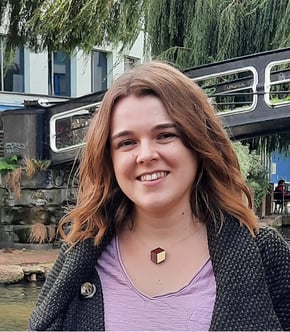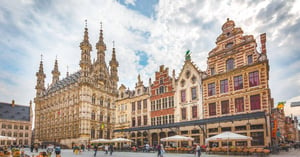Leuven in Belgium is not only the country’s beer capital and home to the Stella Artois brewery, but also a spectacularly sustainable city with a beautiful old town, a UNESCO-listed library, many university students, and a laid-back, cool atmosphere. And by 2050, Leuven wants to be completely climate-neutral. Learn more about the strategy of this smart city!
A networked city
Talking to Thomas Van Oppens, deputy mayor of Leuven, makes it clear why Leuven is special: “As a government we realise our limits, so we have a broad network with our university, companies, citizens and many other organisations. We are truly a networked city. We don’t necessarily work much harder than other cities, but by being a network of entities we are able to achieve many great things” Part of that network is the initiative Leuven 2030, which is led by the city and by higher education institutions, private companies, and citizens. “We participate with everybody in everything we do”, explains Thomas. “We know that we cannot do it alone.”
He lists several projects in the smart domain that always centre around the environment and sustainability. For example, the WeCount project provides AI cameras to citizens with the idea of having cameras in windows that measure how much traffic passes. This data helped the city to create a smart model which can help with decisions like turning streets into one-way streets, closing them to cars, or pedestrianising certain streets. “We showed the results to all inhabitants, to all neighbourhoods. We always take these decisions together.”
Another innovative project in Leuven is called Leuven Cool, where the city and the university work together to put weather stations all over the city in order to measure microclimates and the urban heat island effect. This helped the city government see where it is warmest in the city centre and where to place priorities in neighbourhoods, such as planting trees or unsealing concrete surfaces.
Thomas also mentions the work the city is doing on noise. “We receive many noise complaints because Leuven is a student city and there is a lot of noise at night.” Together with the university, the city government used AI microphones to measure the nightly noise, and identify different sounds and where they came from. This resulted in a strategy for controlling the street lighting on the loudest streets. Whenever noise was detected, the lights would dim with the idea that people are calmer if the lights are less bright. By projecting words like “stiltezone” (quiet zone) on the street, further noise reduction was achieved. Where the system is used, there is 30% less nightly noise just by working with data and nudges, rather than fines.
Climate Neutrality by 2050
Leuven is committed to achieving complete climate neutrality by 2050. With ambitious targets for 2030, the city wants to turn this into a reality. Its strategy includes action in areas such as the renovation of old and new buildings, more sustainable consumption, and green mobility. Already, there are many vegetarian and vegan options in restaurants, which tend to prefer local organisations and businesses over large suppliers. Dozens of green spaces and a large number of heritage buildings with reused materials and sustainable interventions dominate the city. Even street art in Leuven is becoming more sustainable, for example through air-purifying paint, a wall made of recycled plastic, and a vertical garden consisting of PET bottles. In 2018, the Belgian city received the “European Green Leaf” award as a reward for efforts on sustainability and quality of life.
The non-profit organisation Leuven 2030 is working on exciting initiatives for the city that will help achieve the climate neutrality goal. By collaborating with the university and startups, smart city projects can easily be piloted. As part of the EU Mission on Climate-Neutral and Smart Cities, the city is now required to take bold action. In 2019, the Leuven 2030 group achieved a major milestone by creating a Roadmap to climate neutrality with 10 thematic programmes and three cross-cutting programmes. Now, Leuven is seeking to scale and speed up its efforts and contribute firm commitments to the Climate City Contract.
We want to get as close as possible to climate neutrality by 2030. We do this by taking measures as a city, but also by creating climate contracts with our partners.”, explains Thomas. He says that the implementation of the city’s climate contract is expensive, but that the city wants to turn these actions into an asset. “There is always a return on things like insulating your home. How can we market this and pull money towards our city? We want people to invest in the city of Leuven rather than buying a car or Shell shares”. By showcasing the return on investment, the city is looking for ways to find the right incentives for climate change investments.
For the next five years, the city of Leuven is focusing on smart mobility for pedestrians and cyclists as well as public spaces. With the help of smart technologies, downscaling the amount of private car parking is a priority to create more public spaces. Some of these public spaces will also be dedicated to cargo bike sharing. The city has explicitly decided against free-floating sharing systems for scooters and bicycles, instead giving dedicated spaces to shared mobility for optimal service provision.
“Science has the answers”
When asked what other cities could learn from Leuven, Thomas says to work together with partners. “Don’t try to do everything yourself.” He also recommends targeted data collection rather than focusing just on big data. “You need an end user who wants project-based data to solve a problem. This will lead to a change in politics on the local level.” After all, many smart city functions such as sensors, project data and AI applications work locally. When there are discussions on things such as mobility issues like one-way streets or cycling zones, Thomas recommends using data to test different variations and see the best results, which can then inform political discussions. “Science will always provide us with answers on what we need to do to solve problems. But we need to be clear about what we want to solve.”
Find inspiring solutions on our global smart city platform
Join the largest smart city online network and community for free and get in contact with more than 15.000 members worldwide. Discover hundreds of solutions and connect with other smart city enthusiasts to share knowledge, discuss trending topics and forge new partnerships.


